Hacking Politics: How Geeks, Progressives, the Tea Party, Gamers, Anarchists, and Suits Teamed Up to Defeat SOPA and Save the Internet (56 page)
Authors: and David Moon Patrick Ruffini David Segal
Tags: #Bisac Code 1: POL035000

Demand Progress, by contrast, begins to lead during this period the translation of online outrage into political action by initiating a petition drive that ultimately collects over three hundred thousand signatures. This model of translating online debate into congress-focused communications will, of course, become a core force of the efforts to block the laws.
Little occurs in October, but mid-November, as the Senate Judiciary Committee considers and approves COICA, sees a burst of activity. Several features are notable. First, while the Fox News, the
Los Angeles Times
, and other mainstream media outlets begin to take notice, online tech media continue to anchor the flow of information within the controversy. Second, Public Knowledge joins EFF, and begins to take on both the information clearinghouse and attention backbone amplifier roles, roles that it will later play to a much greater degree.
Most dramatically, however, we see the right wing of the blogosphere taking up the resistance to COICA, and we see the left-right coalition online that continues to typify the entire controversy emerge very clearly. In the detail of the map from November, we see a range of libertarian blogs and organizations, like Cato, Atlas Shrugs, or Techfreedom, and the core blogs in the right wing of the general political blogosphere, such Hot Air, Instapundit, and Red State. This emergence of the right wing resistance is initiated by Patrick Ruffini of Engage LLC, a consultancy that specializes in building online campaigns for the political right, which also launches Dontcensorthenet. Ruffini continued to collaborate with David Moon and David Segal of the left-leaning Demand Progress throughout the campaign. Interestingly, the focal point for the right wing was not the Senate’s action on COICA, but the Immigration and Customs Enforcement (ICE) Operation In Our Sites, an allegedly anti-piracy operation which involved extensive seizure of domain names and was seen as sweeping too broadly and aggressively that brought home to liberterians and the right-wing more generally the threat created by COICA.
November 2010, detail.
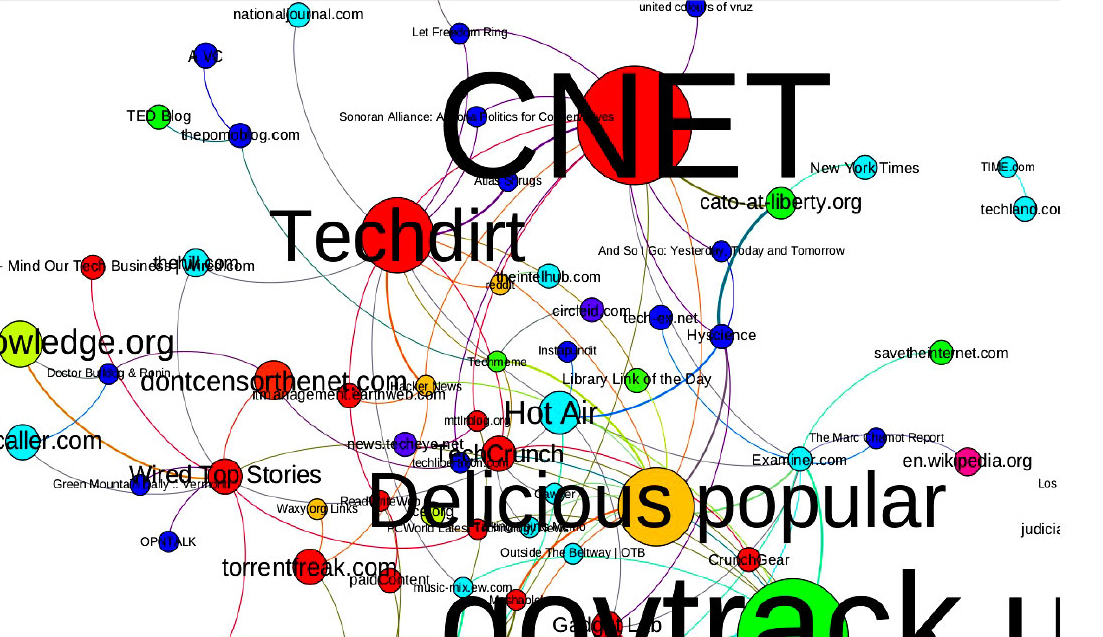
In late November 2010, Senator Wyden blocked lame duck passage of COICA, setting the stage for the reemergence of the controversy in the Spring of 2011, when Senator Leahy introduced the successor bill, PROTECT-IP, or PIPA.
Phase II: PIPA, May 2011
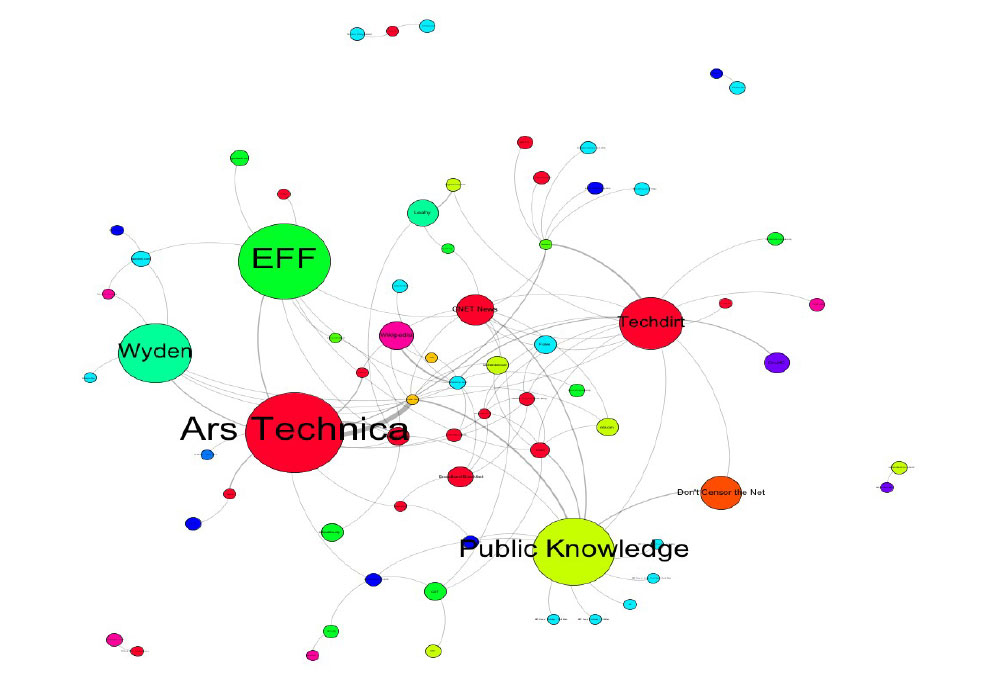
Looking at the entire month of May 2011, we see four major elements. The tech media, with Ars Technica partly replacing Wired and CNET alongside Techdirt; Public Knowledge and EFF share subject-area NGO leadership; special-purpose online campaign, here most prominently the Dontcensorthenet online petition, similar to the Fall of 2010 drive by Demand Progress; and Senator Ron Wyden’s own announcement that he is placing a hold on PIPA but may not be able to stop the flood, which raises the alarm more generally.
When we break May down into before and after Senator Wyden’s hold, we see very clearly that the NGOs and online campaign play a core role in the lead
up to Wyden’s placing the hold, and then tech media take the role of disseminating and amplifying Wyden’s action after the fact.
Week 2, Week 3 May 2011
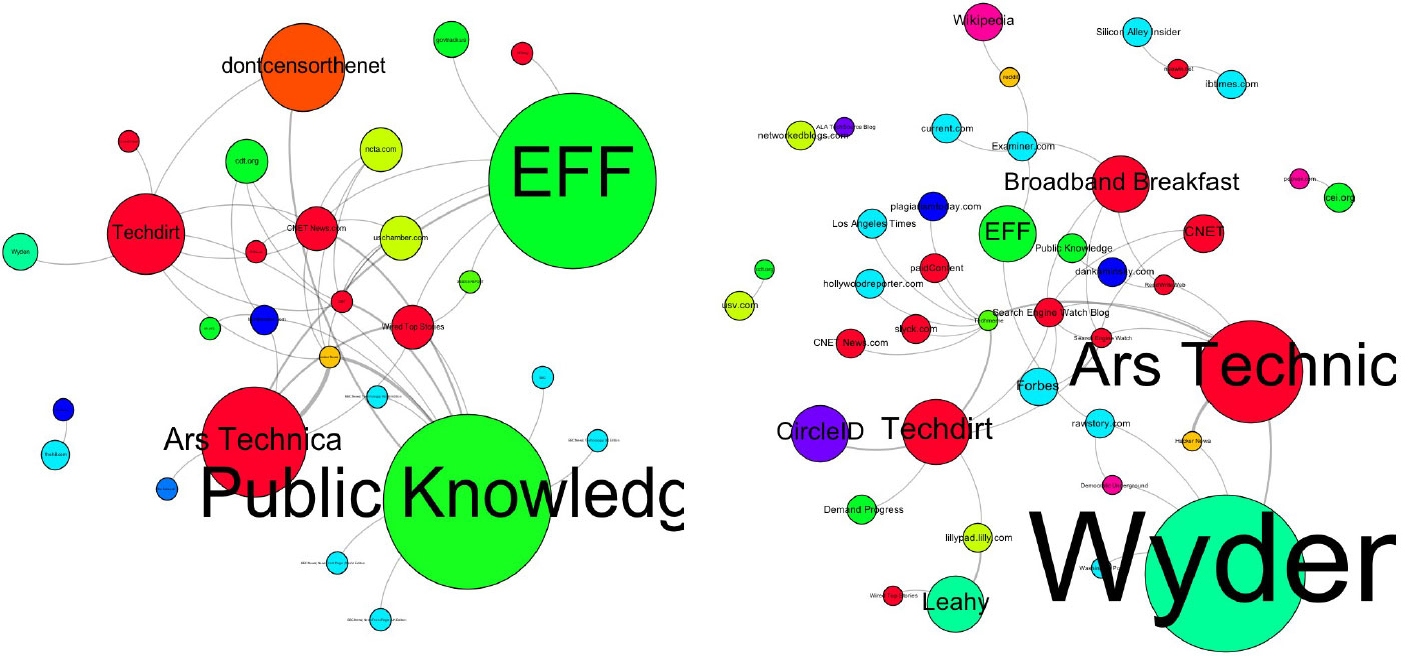
At that point traditional media do begin to pay attention; for, example, the
Washington Post
and the
LA Times appear
, but online these major news sites play a relatively small role. The larger visibility of Forbes in the third week owes to a single online opinion piece by Larry Downes, a highly articulate critic of PIPA.
June 2011 still sees some of the same voices and dynamics already described continue; we note here only significant new observations. First, we see for the first time that a June 8
New York Times
editorial plays a significant role in the conversation. Second, while in May it was the right-of-center petition drive, Dontcensorthenet, that was growing, in June Demand Progress is highly visible. The collaboration between the two groups continues. Third, we see that Union Square Ventures, and its principals Brad Burnham and Fred Wilson as individuals, organizes a letter from venture capitalists explaining how PIPA would endanger innovation on the Net. Finally we see here, as we see elsewhere during this period, that efforts by industry-side interventions, while successful in getting on the editorial pages of the
LA Times
and other media, do not seem to thrive in the online environment.
Here, Digital Media Law is an effort by the screen actors’ guild to support the law; and while it is linked to by the Huffington Post, it does not link to the rest of the conversation.
Phase III: SOPA
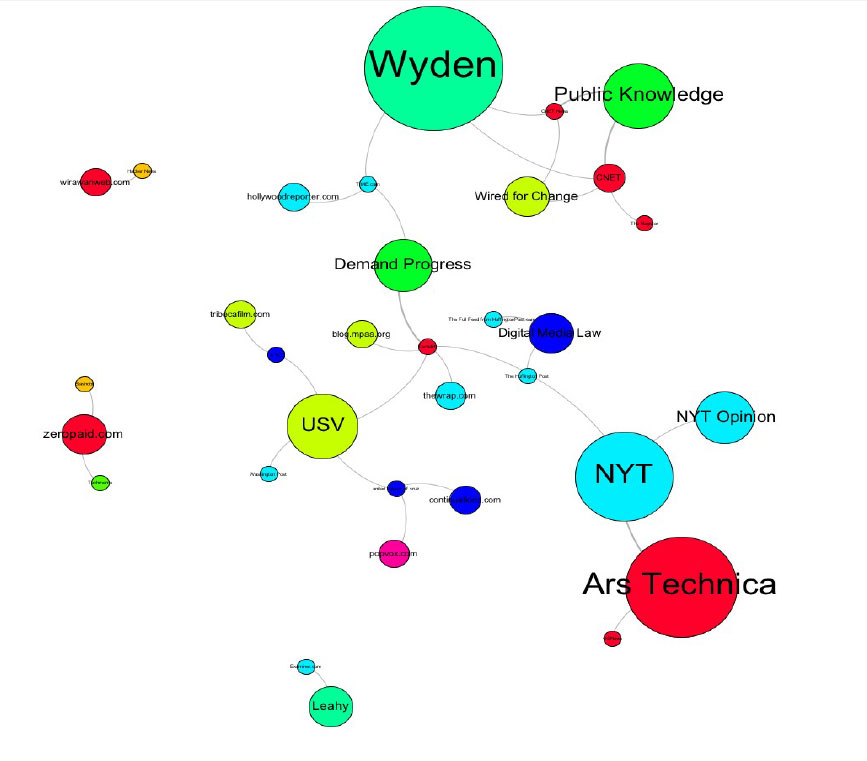
After a summer lull, Congress returned to the arena with the introduction of SOPA in the House on October 26, 2011. The three most important “newcomers” to the maps during these weeks are Wikipedia, Fight for the Future, and Open Congress. Wikipedia at this stage plays a purely information role. The protest that would emerge almost three months later had not yet been hatched, and our analysis of which parts of Wikipedia are being linked to over this period makes it clear that links to Wikipedia are informational: they
are links to the articles on SOPA and PIPA, not to mobilization on talk pages. Fight for the Future (FFTF) and Open Congress, co-founded by Tiffiniy Cheng and Holmes Wilson, come to play a central role from here to the end of the campaign. Here, FFTF marks the first major successful use of video in the anti-SOPA/PIPA campaign, presenting a video informational polemic with a point of action to contact legislators. Open Congress offers a complementary model of access to the written materials on the Act, again, with a point of contact and an ability to “vote” publicly on the bill. The screen actors’ guild (SAG) is active, but does not garner as much attention.
Week of October 24, 2011
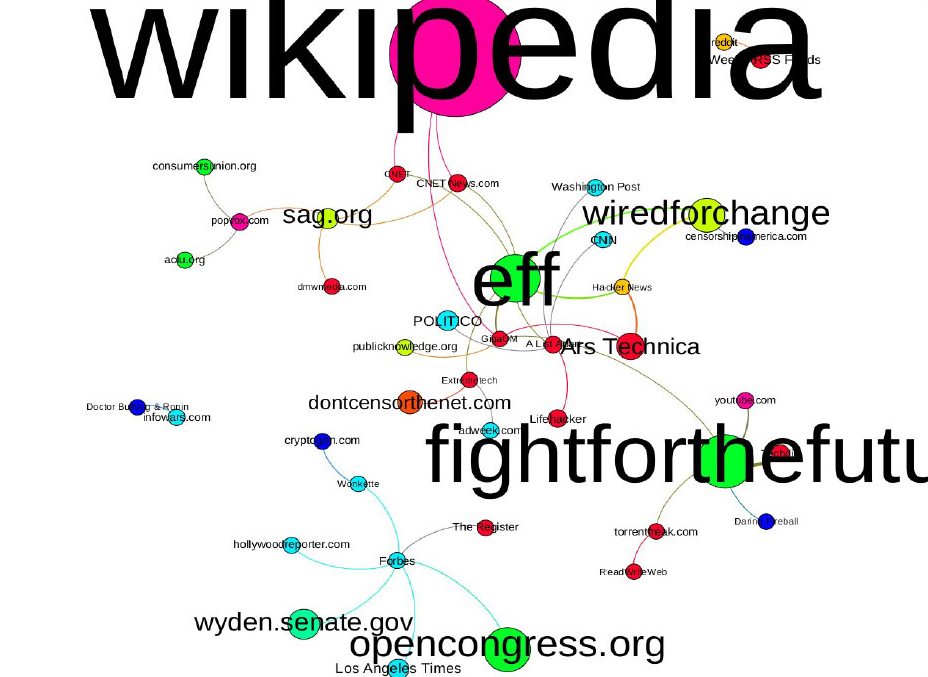
October 31-November 7, 2011
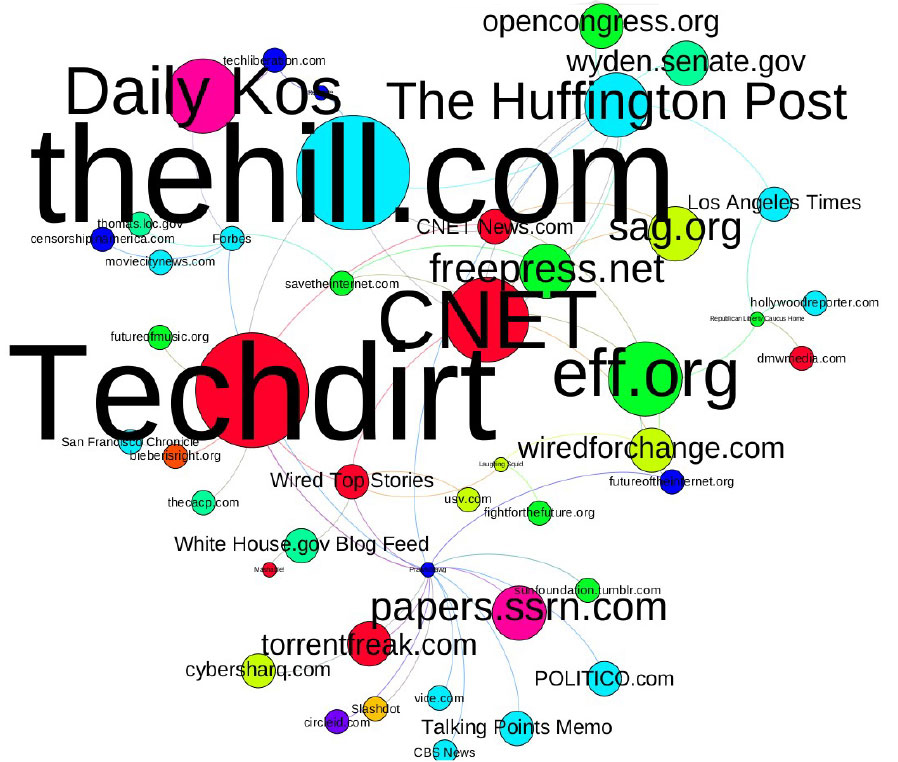
The following week, the first in November, is notable as the only weekly or monthly time slice we observe that looks remotely similar to the prevailing conception of the blogosphere or networked public sphere. It is the only week where Huffington Post, Politico, DailyKos, etc., and traditional media like the
LA Times
or the
Hill
, appear prominently. Similarly, Free Press and the Screen Actors’ Guild (SAG) make a significant appearance. On the other hand, this week also exhibits the possibility that in this network, academic work tackling the issues, rather than simply dueling press releases, can gain visibility. Here, the links to Derek Baumbauer’s paper in SSRN are prominent, driven at least in part by his own cross-posting and linking to them on several platforms like Prawfsblawg. The more “normal” look of this first week provides sharp relief for the remainder of the month, and in particular for the development and emergence of activism, in this case, American Censorship Day. Beginning in the second week in November and continuing from then on, that newly-created site, initiated by the co-founders of Fight for the Future, Participatory Politics Foundation, and Demand Progress with Public Knowledge, the EFF, and support from the Mozilla Foundation, became a major point for coalescence on action, and ultimately the model for the January 18, 2012 protests.
November 7-14, 2011
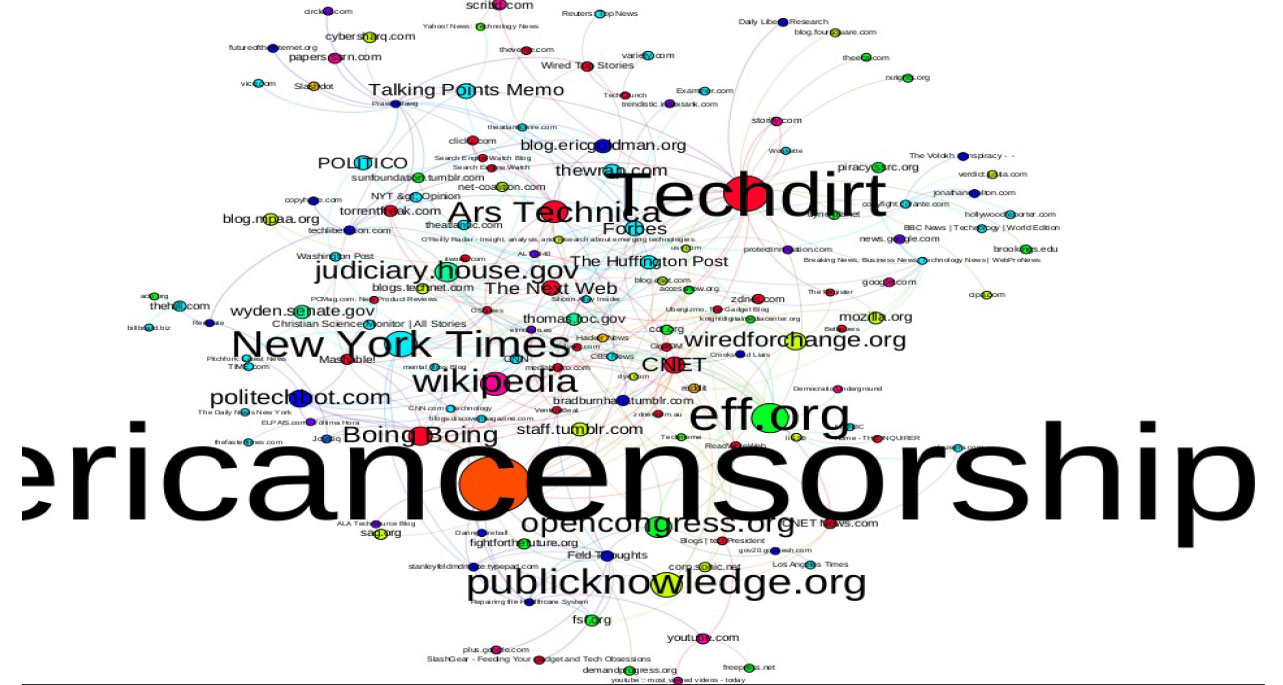
The prominent appearance of the
New York Times
during this period reflects, however, the continued importance of the major outlets. It reflects widespread linking to Rebecca McKinnon’s opinion piece explaining how SOPA and PIPA would strengthen China’s repressive firewall and import part of its capabilities to the United States.
